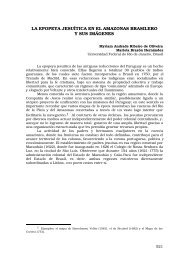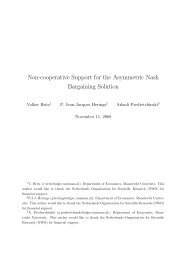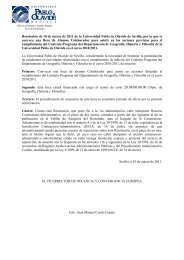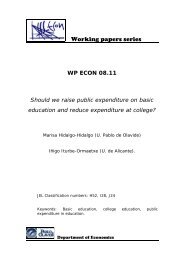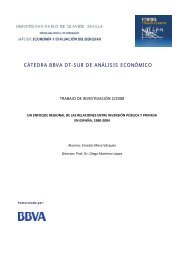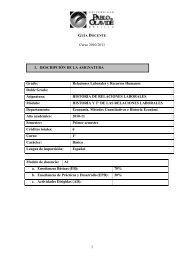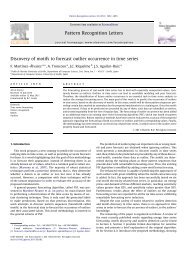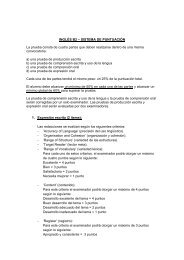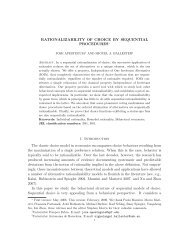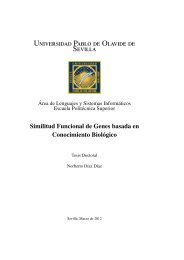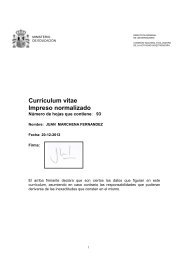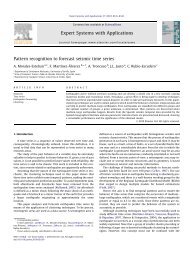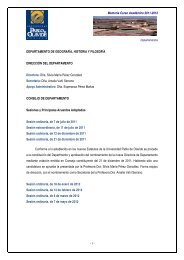Working papers series - Universidad Pablo de Olavide
Working papers series - Universidad Pablo de Olavide
Working papers series - Universidad Pablo de Olavide
You also want an ePaper? Increase the reach of your titles
YUMPU automatically turns print PDFs into web optimized ePapers that Google loves.
At least one letter-report of this sort <strong>de</strong>parted daily towards Paris or London,<br />
always by means of the quickest method: first by private post, then by railway lines,<br />
then the by telegraph and finally by phone. Internal communications worked to<br />
perfection, as we find evi<strong>de</strong>nt in the negotiation of the loan for the Spanish State in<br />
1871. Alphonse and Gustave Rothschild had all the documents about such negotiations,<br />
and showed their surprise to know that the Spanish Finance Commission in Paris did<br />
not have any news on the subject 42 . This was customary, as Weisweiller and Bauer<br />
always acknowledged that they had personnel in charge of forwarding legislative bills<br />
and the −ostensibly secret− terms supplied by other bankers to get the auctions or<br />
contracts, as happened to the Alma<strong>de</strong>n products. These contacts were compensated<br />
generously, but their i<strong>de</strong>ntity was never revealed, not even to the Rothschild<br />
VI<br />
As per usual, the Rothschild stipulated that their agents should act on their<br />
behalf, offering them ample powers of attorney and business. Nevertheless, the system<br />
worked at a level of loyalty and confi<strong>de</strong>nce where the <strong>de</strong>cision and profit areas were<br />
perfectly <strong>de</strong>marcated: agents would carry out as many business operations as they<br />
wanted, informing the parent company in relation to the importance of the issue. The<br />
parent company always ma<strong>de</strong> the final <strong>de</strong>cision, but when the agents acted on behalf of<br />
the Rothschild House, the profit would be kept by the family, without commissions. In<br />
return, the Rothschild would <strong>de</strong>al with the agency charges, plus a fixed retribution.<br />
They usually compensated their agents with small stakes in the businesses they closed,<br />
preference rights in the House issues, and the partaking of some services to the<br />
companies controlled by the family. Hence, for instance, the London House reserved an<br />
eighth of the net profits in Alma<strong>de</strong>n for the partners of the Madrid agency: 50% went to<br />
Bauer, 26.35% to Weisweiller and 23.65% to Ettling 43 . They also reserved the financial<br />
services in Spain of MZA, Deutsch et Cíe. 44 and Peñarroya, which meant a substantial<br />
fixed income to them. 45<br />
There was a certain hierarchy and specialization when <strong>de</strong>aling with the different<br />
business areas. Weisweiller always proved to be the most capable of handling financial<br />
issues, <strong>de</strong>signing the terms supplied for advances and the large loan or credit<br />
transactions to the State. He was also in charge of attending the AGMs at the Bank of<br />
17<br />
http://www.upo.es/econ



